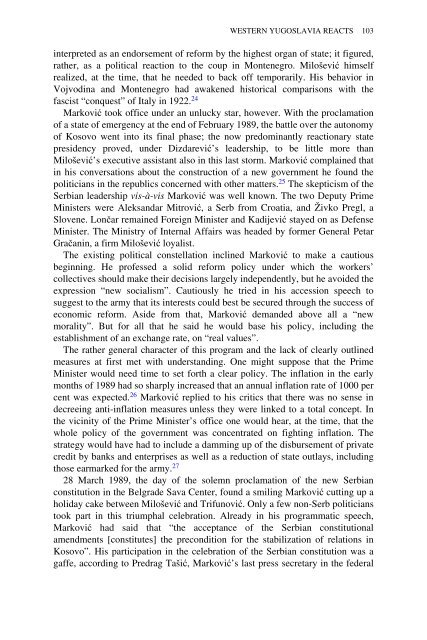Yugoslavia: A History of its Demise - Indymedia
Yugoslavia: A History of its Demise - Indymedia
Yugoslavia: A History of its Demise - Indymedia
You also want an ePaper? Increase the reach of your titles
YUMPU automatically turns print PDFs into web optimized ePapers that Google loves.
WESTERN YUGOSLAVIA REACTS 103<br />
interpreted as an endorsement <strong>of</strong> reform by the highest organ <strong>of</strong> state; it figured,<br />
rather, as a political reaction to the coup in Montenegro. Milošević himself<br />
realized, at the time, that he needed to back <strong>of</strong>f temporarily. His behavior in<br />
Vojvodina and Montenegro had awakened historical comparisons with the<br />
fascist “conquest” <strong>of</strong> Italy in 1922. 24<br />
Marković took <strong>of</strong>fice under an unlucky star, however. With the proclamation<br />
<strong>of</strong> a state <strong>of</strong> emergency at the end <strong>of</strong> February 1989, the battle over the autonomy<br />
<strong>of</strong> Kosovo went into <strong>its</strong> final phase; the now predominantly reactionary state<br />
presidency proved, under Dizdarević’s leadership, to be little more than<br />
Milošević’s executive assistant also in this last storm. Marković complained that<br />
in his conversations about the construction <strong>of</strong> a new government he found the<br />
politicians in the republics concerned with other matters. 25 The skepticism <strong>of</strong> the<br />
Serbian leadership vis-à-vis Marković was well known. The two Deputy Prime<br />
Ministers were Aleksandar Mitrović, a Serb from Croatia, and Živko Pregl, a<br />
Slovene. Lončar remained Foreign Minister and Kadijević stayed on as Defense<br />
Minister. The Ministry <strong>of</strong> Internal Affairs was headed by former General Petar<br />
Gračanin, a firm Milošević loyalist.<br />
The existing political constellation inclined Marković to make a cautious<br />
beginning. He pr<strong>of</strong>essed a solid reform policy under which the workers’<br />
collectives should make their decisions largely independently, but he avoided the<br />
expression “new socialism”. Cautiously he tried in his accession speech to<br />
suggest to the army that <strong>its</strong> interests could best be secured through the success <strong>of</strong><br />
economic reform. Aside from that, Marković demanded above all a “new<br />
morality”. But for all that he said he would base his policy, including the<br />
establishment <strong>of</strong> an exchange rate, on “real values”.<br />
The rather general character <strong>of</strong> this program and the lack <strong>of</strong> clearly outlined<br />
measures at first met with understanding. One might suppose that the Prime<br />
Minister would need time to set forth a clear policy. The inflation in the early<br />
months <strong>of</strong> 1989 had so sharply increased that an annual inflation rate <strong>of</strong> 1000 per<br />
cent was expected. 26 Marković replied to his critics that there was no sense in<br />
decreeing anti-inflation measures unless they were linked to a total concept. In<br />
the vicinity <strong>of</strong> the Prime Minister’s <strong>of</strong>fice one would hear, at the time, that the<br />
whole policy <strong>of</strong> the government was concentrated on fighting inflation. The<br />
strategy would have had to include a damming up <strong>of</strong> the disbursement <strong>of</strong> private<br />
credit by banks and enterprises as well as a reduction <strong>of</strong> state outlays, including<br />
those earmarked for the army. 27<br />
28 March 1989, the day <strong>of</strong> the solemn proclamation <strong>of</strong> the new Serbian<br />
constitution in the Belgrade Sava Center, found a smiling Marković cutting up a<br />
holiday cake between Milošević and Trifunović. Only a few non-Serb politicians<br />
took part in this triumphal celebration. Already in his programmatic speech,<br />
Marković had said that “the acceptance <strong>of</strong> the Serbian constitutional<br />
amendments [constitutes] the precondition for the stabilization <strong>of</strong> relations in<br />
Kosovo”. His participation in the celebration <strong>of</strong> the Serbian constitution was a<br />
gaffe, according to Predrag Tašić, Marković’s last press secretary in the federal
















